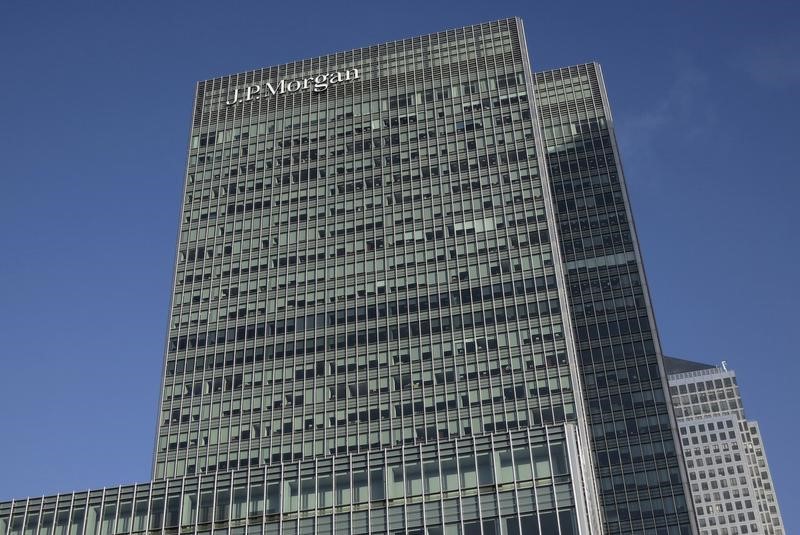(Reuters) – The U.S. banking crisis is ongoing and will have effects for years to come, JPMorgan Chase & Co (NYSE:) CEO Jamie Dimon wrote in a letter to shareholders on Tuesday.
“The current crisis is not yet over, and even when it is behind us, there will be repercussions from it for years to come,” Dimon wrote in a 43-page annual message covering a range of topics from JPMorgan’s performance to geopolitics and regulation.
Here are some snippets from the letter:
ON BANKING CRISIS
* “Regarding the current disruption in the U.S. banking system, most of the risks were hiding in plain sight.”
* “These failures were not good for banks of any size.”
* “While it is true that this bank crisis ‘benefited’ larger banks due to the inflow of deposits they received from smaller institutions, the notion that this meltdown was good for them in any way is absurd.”
* “While this crisis will pass, lessons will be learned, which will result in some changes to the regulatory system. However, it is extremely important that we avoid knee-jerk, whack-a-mole or politically motivated responses that often result in achieving the opposite of what people intended.”
* “The debate should not always be about more or less regulation but about what mix of regulations will keep America’s banking system the best in the world.”
ON THE ECONOMY
* “Until the collapse of Silicon Valley Bank, the current economy was performing adequately, both here in the United States and remarkably better than anyone expected in Europe.”
* “There has been a lot of market volatility over the past year, partially, in my opinion, as people over-extrapolate monthly data, which is highly distorted by inflation, supply chain adjustments, consumer substitution, basically poor assumptions about housing costs and other factors.”
* “We’ve had 10 years of home and stock price appreciation, and even if we go into a recession, consumers would enter it in far better shape than during the great financial crisis.”
* “The failures of SVB and Credit Suisse have significantly changed the market’s expectations, bond prices have recovered dramatically, the stock market is down and the market’s odds of a recession have increased.”
* “To varying degrees, banks will compete for money, not only among one another but also with money market funds, other investments and the Fed itself.”
ON REGULATION
* “Resolution and recovery regulations did not work particularly well during the recent crisis – we should bring clarity and reassurance to both the unwinding process and measures to reduce the risk of additional bank runs.”
* “It should be noted that regulations, the supervisory regime and the resolution regime currently in place did not stop SVB and Signature Bank (OTC:) from failing — and from causing systemwide issues.”
* “In the last few years, we have had many situations in which disruptions in the market were, in my opinion, largely caused by certain regulations that did not improve the safety of the market maker but, instead, damaged the safety of the whole system.”
* “Regulatory arbitrage is already forcing many activities, from certain types of lending to certain types of trading, outside the banking system.”
* “If done properly, banking regulations could be calibrated — adding virtually no additional risk — to make it easier for banks to make loans, intermediate markets, finance the economy, manage a run on their bank and fail if need be.”
ON ARTIFICIAL INTELLIGENCE
* “AI and the raw material that feeds it, data, will be critical to our company’s future success.”
* “AI has helped us to significantly decrease risk in our retail business and improve trading optimization and portfolio construction.”
* “We have spent over $2 billion building new, cloud-based data centers and are working to modernize a significant portion of our applications (and their related databases) to run in both our public and private cloud environments.”
ON CLIMATE
* “The window for action to avert the costliest impacts of global climate change is closing.”
* “The need to provide energy affordably and reliably for today, as well as make the necessary investments to decarbonize for tomorrow, underscores the inextricable links between economic growth, energy security and climate change.”
* “Bolstering growth must go hand in hand with both securing an energy future and meeting science-based climate targets for future generations.”
ON GEOPOLITICS
* The Ukraine crisis is “leading to the rethinking of many economic alliances, as well as trade and national security. All these factors create more risk and potentially higher inflation.”
* “Less-predictable geopolitics, in general, and a complex adjustment to relationships with China are probably leading to higher military spending and a realignment of global economic and military alliances.”
* “Inflation and interest rates are not the things that worry me the most. I’m most concerned about large geopolitical events, cyber attacks, nuclear proliferation, large dysfunctional markets and failure of other critical infrastructure.”
Read the full article here








